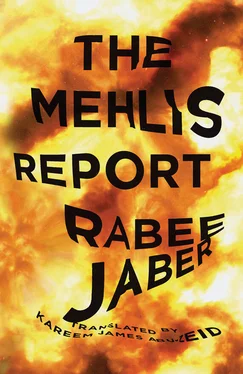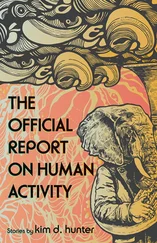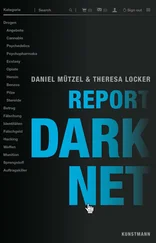Saman Yarid rubs the collar of his shirt, then smells his finger. The scent of his cologne, Cacharel ; and the opposing smell of sweat; and that of cloth. All of it mixed together into a single familiar smell. He cannot detect a trace of Yara’s perfume, J’adore , but he can still feel her strong embrace through his entire body.
Yara had parked her car underground, beneath the small fountains by the Municipality Building. The two of them walked side by side from the Chinese restaurant on Foch Street to the fountains. As they were leaving the restaurant and she was thanking him for lunch, she leaned against him and held onto his arm. She seemed to be lurching a bit as she walked, although neither of them had drunk any wine. He thought it must be her high heels. Her lovely weight on his arm. The whispering in his ear. And her perfume. She did this every time they left a restaurant. Yet after a few steps she put a finger — the length of a finger, that is — between her body and his. She stopped for a moment in front of the Timberland store and pointed at some things in the window: a fleeting movement. Then they went on their way, as did their reflections in the storefront window.
She seemed nervous while they waited for her car at the parking lot entrance. He didn’t know why. The green Range Rover emerged from the belly of the earth. It stopped in front of her. The parking attendant got out and stood by the open door. She quickly embraced Saman. He could feel the breath leave her chest: the embrace was full of emotion. Her chest pressed through her ribs, then receded as she said goodbye:
“I feel like it’s going to be a long trip this time. As if I’m not coming back. It’s strange. I feel like I’m going to be gone for a very long time. I’ll miss you, Saman. I’ll be thinking about you.”
She got in the Range Rover and handed the attendant a lemon-colored banknote, then settled in behind the steering wheel. The young attendant in the uniform lingered by the door of the car, standing there and thanking her. Then he finally got the message and moved along. Yara’s face suddenly seemed so far away. She nodded her head as she looked at the stream of cars in front of the fountain. Rue Weygand was full of cars.
“Make sure you behave in Amsterdam.”
The cell phone starts vibrating again in his pocket. This time he doesn’t answer. He looks at the number and doesn’t answer.
He passes by the BLOM bank and the new sidewalk behind the buildings on Maarad Street that descends to the Place de l’Étoile . There aren’t many customers on this side of the street either. Spotlights light up Roman columns underneath the street. Crowns of sculptured marble. Thresholds. Grass sprouting among the stones. He’s seen the plans for this park. And the long winding path among the ruins. When will this park be completed? The view will be different on this side once it’s finished. The fish market was here before the war, behind the Banca di Roma . He used to come here with his father. The bank has since moved to Al-Omari Mosque Street. Its building collapsed during the war. Or rather, half of it collapsed, and the Solidere bulldozers removed the other half. These columns were discovered beneath the debris, after the rubble was dug up and dumped into the sea. The plan had been to put up some buildings here. The Roman columns changed that plan. Saman has the very first map of the ruins in his office. And he has the amended maps as well. He recalls spreading them out on his desk, beneath the white light, and comparing them to one another: a labyrinth of blue lines, and beneath it another labyrinth, like the first one and unlike it. He recalls folding up the maps and heading out to the lighted street. The humidity was glistening around the tall streetlamps, beneath the arches of Maarad Street — high arches from the French Mandate period. His grandfather built three buildings on this street, in the old days. His grandmother said Youssef Aftimus was his only real competition in all of Beirut, the same Aftimus who designed the Municipality Building: he won the right to design that building because he was a friend of the French High Commissioner, who used to eat at his place every Sunday.
The headlights of the cars blind him. As he crosses the broad sidewalk in front of the restaurant at the bottom of the Lazariyyah Complex, he can smell the markouk flatbread. And he can smell the shish barak as well: meat and onions and sumac; dough boiling in yogurt. He sees a woman dressed in white sitting in the restaurant window. She’s kneading the dough and spreading it onto baking sheets. She throws it into the air and catches it on her bare arm while gazing at the passersby outside the window. That woman looks like a fish, Saman Yarid says to himself.
He turns at the corner in front of the DHL window. A dark-haired woman with a freckled face is behind the counter. Cars exit from the parking lot beneath the Lazariyyah Complex. He waits for them to pass, then continues on his way. The streetlights trace geometric forms on the oval dome of the ruined City Palace Cinema. When was that dome built? At the end of the sixties? He remembers the wall that used to be beneath the dome. They demolished it after the war, and so the columns became visible, as did the empty space beneath the dome. Through that empty space, the dome looks as if it’s hanging in the air like a flying saucer. During the war, in a moment of cease-fire between the two sides of the city, he had gone there with some friends and discovered people were living there. Poor people, and people who had been displaced from distant regions. Lebanese, Syrians, Palestinians, Sudanese, Somalis, and Egyptians. A whole host of dialects. The cinema had been transformed into a residential complex. He had seen Mercedes and Peugeots parked there. And he had eaten a sandwich in a restaurant that, along with its building, has since been destroyed, gone now, existing only in his head. Could he recall what he’d eaten there? A sausage sandwich. It might have been the most delicious sandwich of his life. He can still remember the hot sauce. The spices. The garlic. The redolent meat. And the napkin around the sandwich. The Yarid Architecture and Design Agency had finally taken part in a competition to determine the future layout of this part of Solidere City, but the Brazilian plans were better. The oval dome adorned in glass and mirrors and metal and silver had enchanted him. The drawings had shimmered. In front of the dome, the empty white plaza had stretched between the two parallel streets, but it’s an entirely different plaza now: elevators and strangely shaped trees; stores on different levels, and marble passageways; blue neon lights, and purple ones, and yellow ones too. The lights were designed specifically for this plaza.
Underneath the Fuad Shihab Bridge, his cell phone vibrates in his pocket. He stands beneath the bridge and turns around to look at the dome, and then at the Lazariyyah Complex and the four minarets of the Mohammad al-Amin Mosque. Orange light on the celestial dome. The giant mosque with its symmetrical minarets dominates the space there. The Virgin building looks tiny in the distance, yet its white stone and the way it’s lit up in red somehow push it into the foreground, into the great void in front of the buildings, like something jutting out of a painting.
Across the void between the buildings, the Saray Mosque (the Mansour Assaf Mosque) can be seen, as can the Municipality Building. The spotlights lift up the Municipality, as if were no longer connected to the ground. Its Ottoman style and its broad façade give it a two-dimensional quality, as if it were a picture, as if it were a building on a large flat screen, as if it were the screen itself. If you stop on Hussein al-Ahdab Street (in front of Second Cup Café or the Étoile Suites Hotel) and look at the Municipality Building, you feel like you’re looking at a picture. The windows. The three floors. The jagged teeth jutting out from the edge of the roof. That symmetrical geometry. The polished yellow stone. His grandfather admitted that Youssef Aftimus had talent. The two men weren’t friends. But they respected one another. His grandmother once said that wasn’t common anymore: respect was a rarity these days.
Читать дальше












